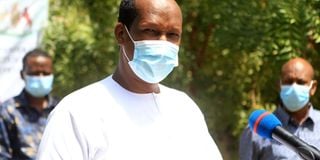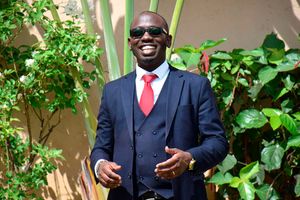Premium
Northeast counties bogged down by Covid-19 testing burden

What you need to know:
- Testing of Covid-19 is the responsibility of the national government.
- Those who have given samples must wait for three to seven days to get results.
- The government put up a regional testing centre at Wajir County Hospital to serve Isiolo, Mandera, Garissa and Wajir.
- The machine broke down after just two weeks.
Counties in the northeast are paying a heavy price for Covid-19 testing as most have to fly their samples to Nairobi.
As county governments struggle to meet the 300 isolation bed capacity target set by President Uhuru Kenyatta, they also have to make impromptu budgets to charter flights that carry the samples to Kenya Medical Research Institute (Kemri) and the National Influenza Centre laboratories.
Mandera County, which borders Somalia and Ethiopia, spent Sh700,000 for every chartered flight.
When the government locked down the region, some Sh4.2 million was used to hire six flights for three months.
Health Executive Muhammud Eden told the Nation that the government also hired Amref planes for the county three times.
Lockdown
“This was when Mandera was in lockdown. There was no moving in or out of the county. We now spend Sh40,000 on one round trip,” the executive said.
“We pay for the samples as they are cargo and tickets for the laboratory technician.”
Testing of Covid-19 is the responsibility of the national government.
“When the country registered its first coronavirus case, the government warned against setting up laboratories in counties since setting standards has to be done at national level. Those in far-flung regions are spending a fortune to have samples tested,” he said
Travelling by road from Mandera to Nairobi takes two days, and the samples have to be placed in containers with a particular range of temperature.
Waiting for results
Apart the costly transport costs, those who have given samples must wait for three to seven days to get results.
“This is another problem. For a whole week, health officials do not know the fate of residents whose samples have been taken. They don’t know if to be extra cautious when protecting themselves and have to work on the assumption that the locals are infected. This is unimaginable terror,” Dr Eden told the Nation.
The reagents at the National Influenza Laboratory ran out when the county took samples there last month.
The samples had to be rerouted to Kemri. The sample owners had to wait for eight days to know their Covid-19 status.
Testing machines
“We were ready to buy the testing machines but our request was rejected. We instead were told to configure the Gene Xpert machines for testing TB to test coronavirus,” he said
The government was to buy cartridges for the machines but that never happened.
Two months later, the government said it tried in vain to get the cartridges.
“Counties without the testing capacity have been left to their own devices,” he said
The government then put up a regional testing centre at Wajir County Hospital to serve Isiolo, Mandera, Garissa and Wajir.
The machine broke down after just two weeks.
It was then taken to Nairobi for repair but nothing happened after that.
“It is so frustrating that we are burying suspected cases even before their results are back,” Dr Eden said.
The Wajir centre was built by the World Bank under the East Africa Public Health Laboratory Networking Project.
It can test 60 to 100 samples daily. Before that, it acted as the regional referral laboratory in clinical diagnosis, disease surveillance and outbreak investigations.
The county government and Kemri are setting up a testing station at Mandera Referral Hospital to lower costs and reduce the long wait for results.
Community transmissions
The World Health Organisation has warned the government of widespread community transmissions if urgent measures are not taken.
In a letter to Health Cabinet Secretary Mutahi Kagwe, WHO Kenya Representative Rudi Eggers highlighted the need for the country to increase Covid-19 testing capacity and report the results fast in order to isolate the confirmed cases in a timely manner.
Kenya has failed on this. In the last two weeks, the size of the samples has greatly reduced largely because of testing material shortages.
This has affected the turnaround time of the results from 24 hours to even a week.
Because of this, contact tracing and isolation of positive cases has been greatly affected.
Contact tracing
The UN health agency says contact tracing should begin as soon as one is confirmed to have the illness.
With the delayed testing of the samples, this might be a big challenge.
Earlier, the Frontier Counties Development Council (FCDC) called on the government to support arid and semi-arid regions in their fight against the Covid-19 pandemic.
FCDC comprises Lamu, Tana River, Garissa, Wajir, Mandera, Marsabit, Isiolo, Turkana, Samburu and West Pokot counties.
The chairman of the council who is also Mandera Governor Ali Roba, said the region is not prepared to fight coronavirus and its situation needs effective evaluation.
“Counties in dry regions need targeted support from the Ministries of Health, Water and non-State actors. We are ill-prepared to deal with the new challenges,” Mr Roba said.
“While our counties are putting in place what they believe to be adequate measures to deal with the challenges of Covid-19, their real state of preparedness has not been effectively evaluated. As such, it is not possible to tell in candid terms what we are doing as devolved governments.”
Fragile health systems
The Mandera governor added that the fragile health systems in the northern, northeast and southeast Kenya are severely being tested.
The country recorded its first Covid-19 case on March 13 while Mandera had its first on April 2.
“By the time Mandera County reported the case, we had had several meetings with national government officials, trying to put things in order,” Governor Roba said.
“But when we witnessed the pace at which things were moving, we took the decision as a county to move forward. Because of our stretched health system, we knew we would be hit very hard by this pandemic. We set aside an emergency supplementary budget of Sh187million to procure supplies and set up isolation centres.”
Training of health workers to handle Covid-19 patients was another problem.
The national government is accused dragging its feet on key health matters.
“We have in the past experienced emergency disease outbreaks. We looked for trainers of trainers who had been shown how to handle the Rift Valley Fever,” the county boss said.
“We used the team to conduct our own training. By the time the government was sending its teams, we had reported 18 coronavirus cases. Imagine what would have happened if we had not taken that step.”





